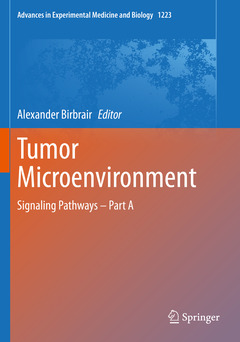Tumor Microenvironment, 1st ed. 2020 Signaling Pathways – Part A Advances in Experimental Medicine and Biology Series, Vol. 1223
Coordonnateur : Birbrair Alexander

Revealing essential roles of the tumor microenvironment in cancer progression, this book provides a comprehensive overview of the latest research on how different signaling pathways are important in the tumor microenvironment. Multiple signaling pathways are covered, including S1P, neuregulin, Notch, erythropoietin, Rho-ROCK, mTOR, and more.
Taken alongside its companion volumes, these books update us on what we know about various aspects of the tumor microenvironment as well as future directions. Tumor Microenvironment: Signaling Pathways ? Part A is essential reading for advanced cell biology and cancer biology students as well as researchers seeking an update on research in the tumor microenvironment.
Shaping of the tumor microenvironment by Notch signaling.- Erythropoietin signaling in the microenvironment of tumors and healthy tissues.- Neuropilin – handyman and power broker in the tumor microenvironment.- Translational landscape of mTOR signaling in integrating cues between cancer and tumor microenvironment.- Toll-like receptors signaling in the tumor microenvironment.- Rho-ROCK signaling in normal physiology and as a key player in shaping the tumor microenvironment.- S1P signaling in the tumor microenvironment.- CD200-CD200R pathway in the regulation of tumor immune microenvironment and immunotherapy.- Index.
Alexander Birbrair received his Bachelor’s Biomedical degree from Santa Cruz State University in Brazil. He moved to North Carolina, where he finished his PhD in Neuroscience under the mentorship of Osvaldo Delbono. Then, he joined as a posdoc in Stem Cell Biology at Paul Frenette’s laboratory at Albert Einstein School of Medicine. In 2016, he was appointed faculty at Federal University of Minas Gerais in Brazil, where he started his own lab. His laboratory is interested in understanding how the cellular components of different tissues function and control disease progression. His group explores the roles of specific cell populations in the tissue microenvironment by using state-of-the-art techniques. His research is funded by the Serrapilheira Institute, CNPq, CAPES, and FAPEMIG. In 2018, Alexander was elected affiliate member of the Brazilian Academy of Sciences (ABC), and, in 2019, he was elected member of the Global Young Academy (GYA).
Date de parution : 02-2021
Ouvrage de 170 p.
17.8x25.4 cm
Date de parution : 02-2020
Ouvrage de 170 p.
17.8x25.4 cm
Thèmes de Tumor Microenvironment :
Mots-clés :
Estrogen signaling tumor microenvironment; estrogen tumor; RANK signaling tumor microenvironment; Neuropilins signaling tumor microenvironment; Eph/ephrin signaling tumor; Rho-ROCK signaling tumor; mTOR Signaling Tumor Microenvironment; Renin-angiotensin system tumor; Nitric oxide signaling tumor; Interferon signaling tumor microenvironment; Frizzled4 signaling tumor microenvironment; nitric oxide signaling tumor; toll receptor signaling tumor



